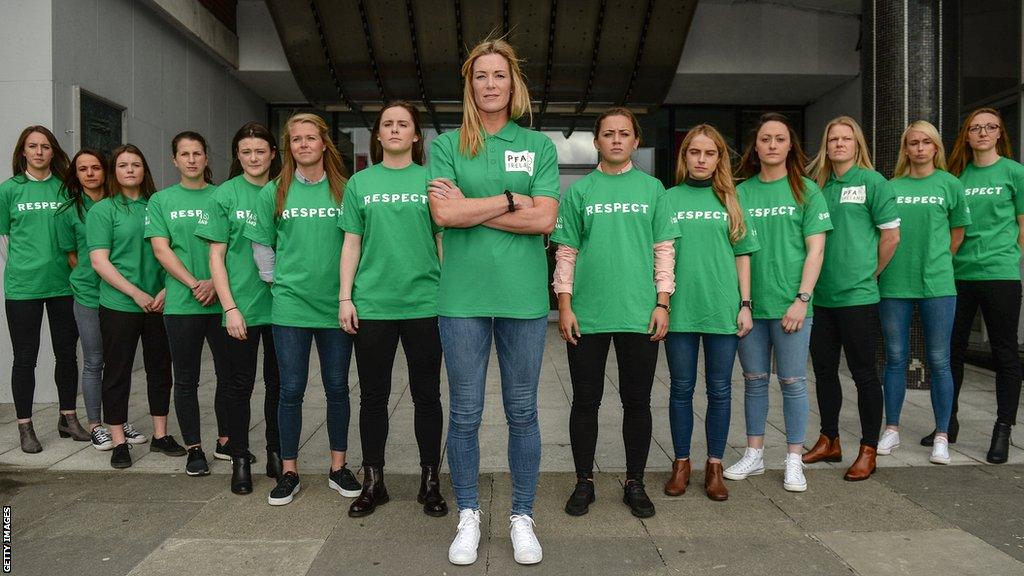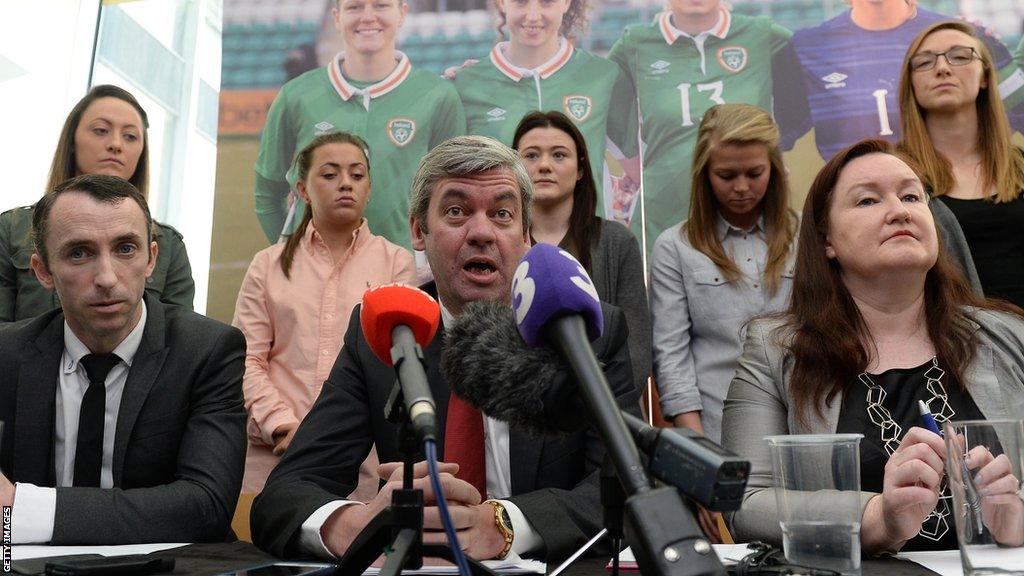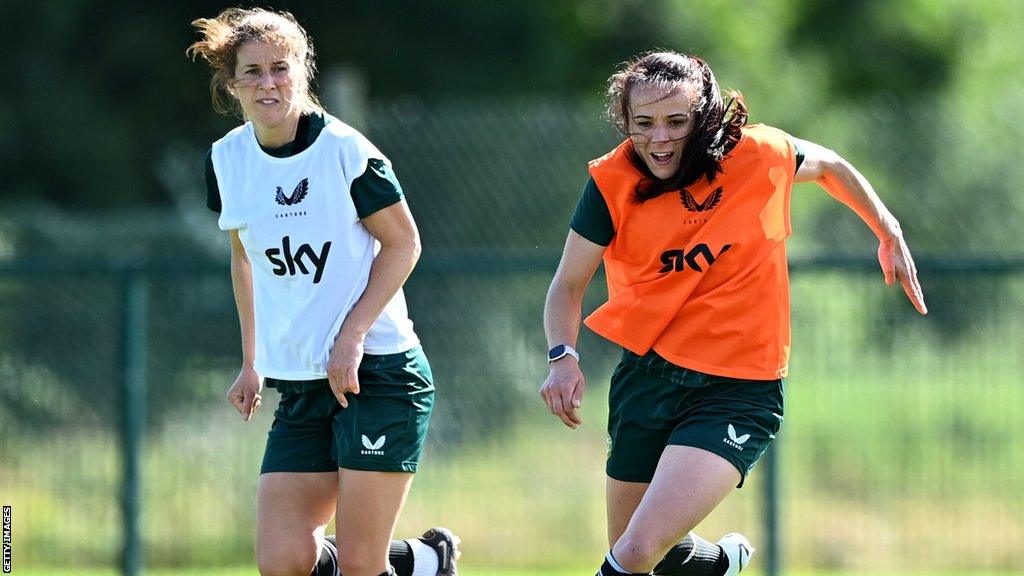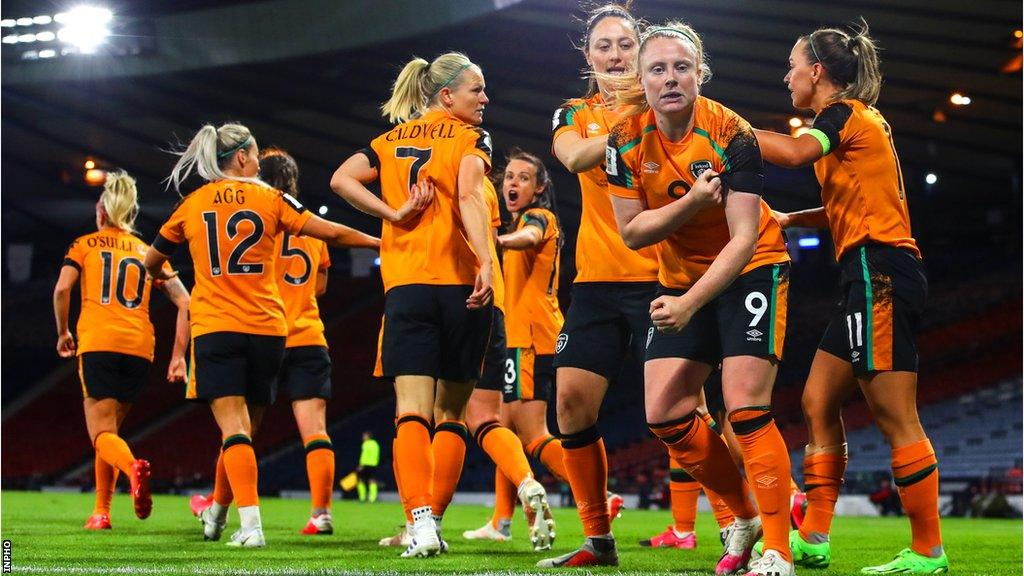Women's World Cup 2023: From changing in airport toilets to qualifying for first tournament
- Published

The Republic of Ireland's players took a stand at Liberty Hall in April 2017
It's a great time to be involved in women's football in the Republic of Ireland as Vera Pauw's side get ready for their first World Cup.
However, it wasn't always this way.
On 4 April 2017, less than six years before their historic qualification, 16 players took an extraordinary stand at Liberty Hall in Dublin to highlight a lack of support from the Football Association of Ireland [FAI].
It was an unprecedented moment, a brave move which ultimately laid the foundations for their future success.
It was costing players to play for their country, there was a lack of resources and the players complained about having to get changed in airport toilets in order to hand tracksuits back at the end of international camps.
It was time for an ultimatum. The message was clear: conditions must improve and the players must be listened to, or the team would go on strike for the upcoming friendly with Slovakia.
As Stuart Gilhooly, a solicitor for the Professional Footballers' Association of Ireland [PFAI], said at the time, he felt the senior women's team was "the dirt on the shoe of the FAI".
"It's easy to forget just how bad things were," Gilhooly recalled.
"The tracksuits, I think were a bit of a side show, but in reality what we wanted to ensure was the players, particularly domestic players, it didn't actually cost them money to play for their country.
"They were having to forgo their work commitments, not get paid for work and they were getting nothing for showing up to play for their country.
"They needed to get paid for turning up to matches, which they weren't.
"Just the most basic of conditions you would expect an international football team to have."
'It was extremely brave'
Gilhooly said he and Stephen McGuinness, general secretary at the PFAI, were approached by captain Emma Byrne and Aine O'Gorman two years before that fateful day at Liberty Hall about seeking an improvement in conditions.
He added the women's team were in a "totally, utterly impoverished situation" and said letters were written to the FAI, requesting meetings about improvements.
He said those meeting requests were denied, and the players' pleas were falling on deaf ears.
The process of meeting requests and unanswered letters led to an "impasse", according to Gilhooly, and the stand-off led to the events in Liberty Hall.
Aine O'Gorman, who made her debut in 2006 and is the most experienced player in the squad who will head to the World Cup, said it was "a difficult moment for everyone involved".
"It's something we didn't really want to do, but we felt we had to do," the 34-year-old said.
"You were sitting down the back of the bus looking at what other countries were doing, and what we were doing, and we felt we weren't really getting the support.
"It was time to stop moaning about it and time to do something about it, I suppose.
"We all got together and obviously it was a collective and how strong we were together."

PFAI solicitor Stuart Gilhooly (centre) was a key figure in the team's stand
Within 24 hours of the press conference, a mediator was put in place between the players and association and, after talks "all night", Gilhooly said "we achieved what we wanted to achieve".
"The players did get paid and it ensured they were not going to be out of pocket for any expenses.
"There were a number of small but very important developments which came out as part of the agreement."
He added the wider perception of the team was almost as important as the conditions that were outlined.
"Prior to that, I'm not sure even how aware how much the public in Ireland were aware of the team.
"It gave the team a public forum and it put them in the spotlight. For a couple of days, the women's national team was the biggest story in Ireland.
"It's only six years since it occurred, but now the team, for sporting reasons, one of the biggest stories in Ireland.
"That's the great thing that has arose out of it. For purely sporting reasons they are now at that level."
Gilhooly added it was an "incredibly brave" move to take and highlighted other situations where players have been sidelined after standing up for what they believe in.
Sine that moment, the relationship between the FAI and the players has only gone from strength to strength.
In 2021, it was announced that both the men's and women's teams would receive equal pay and, just a year later, their ultimate goal was achieved when they qualified for the World Cup.
"From the point of view of them standing in front of a bunch of cameras and being very, very clear about what they wanted and how disappointed with what had occurred to them," added Gilhooly.
"That takes bravery to do that, but I think the braver thing was they put their international careers on the line.
"We have seen from other countries where players have taken stances, and then they simply get dropped.
"That was the danger that they faced. Of course, they were threatened at the time, that if they did do this then they would be putting their international careers at risk.
"That didn't stop them. They were prepared to take it on and they made a calculated gamble that if they did that then it would work out for them and, more importantly, for future generations.
"Those future generations are now reaping the benefits of that."
'It was a turning point'
Niamh Fahey, who has won 107 caps and was one of those who took a stand at Liberty Hall, described it as a "turning point".
"The conditions were well documented and the standards that we needed we felt we weren't being given," she said.
"We thought that was hampering us in terms of qualifying for a major tournament.
"All the players together were so unified and that was our biggest strength.
"We made a stand and conditions changed. We are now on a good wavelength [with the FAI], communication has improved and this is the result of that stand."

Niamh Fahey (left) and Aine O'Gorman (right) will both head to the World Cup
O'Gorman echoed those thoughts and said "having that platform to perform has really paid off".
"That's what we really needed to be successful," the 34-year-old added.
"From there, we have had the full backing of the FAI and conditions have improved significantly.
"We have reaped the rewards. The team is stacked with individual quality. We have always had a talented bunch of players, but without that togetherness and that pride and passion we have to wear the green jersey, that is what gives us the extra percent to help us get results.
"The association has backed us and we have had big sponsors come on board which have given us exposure and that extra boost.
"I think there was always an inner belief within the squad that we could achieve something special and it has obviously come to fruition."
It is a remarkable turnaround that just five-and-a-half years since that now iconic press conference, the team - with so many of the players still in the squad - made history by reaching the sport's biggest stage.
After battling for their voices to be heard, Fahey said there was pressure to improve on the pitch and show they deserved their place.
"You're asking for all these things but you have to be able to back it up," said the Liverpool defender.
"We got the pay agreement two years ago and that was almost like a switch. You have to start winning games and there is pressure that comes with that.
"We've handled that really well with how we managed that. We have produced what we needed to produce and that has taken us to a major finals."
'They can become heroes'
Katie McCabe, who took over as captain when Byrne retired in 2017, says the fact they have qualified for a major tournament "is a credit to the team" - and hopes there is more to come.
"We have put ourselves in this position to get better support and playing facilities. It has been a constant fight the last number of years.
"Players who have represented Ireland before me, we have always been pushing to improve, improve and improve the team.
"We now have a great relationship with the FAI and we can now just focus on performing and getting results, and that has led to the success that we have had.
"We don't want it to be a one-time thing. We want it to be standard now and hopefully it will be a recurring theme over the next few years."

The Republic of Ireland qualified for the World Cup just five-and-a-half years after their stand
Gilhooly added there has been a "sea change" in attitudes towards the team, and there will be a "sense of pride of a nation" when McCabe leads the team out against co-hosts Australia in Sydney.
"I think it will be an emotional moment for the nation and for everyone," he added.
"They were seen as an absolute inconvenience, but they are now regarded as diamonds, and rightly so.
"It's now very different personnel in the FAI and are a much more professional organisation and fair-minded. That has to be acknowledged as well.
"I think the general perception of how the women's team is seen now is a million miles away from where it was.
"Particularly young girls, they see this team as something to aspire to, making them believe that they too can become football heroes."